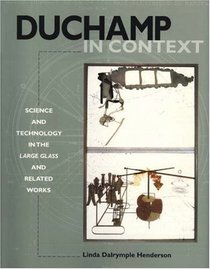Search -
Duchamp in Context
Duchamp in Context
Author:
Between 1915 and 1923, Marcel Duchamp created one of the most mystifying art works of the early twentieth century: The Bride Stripped Bare by Her Bachelors, Even (also known as the Large Glass). The work is over nine feet tall, and on its glass surface Duchamp used such unorthodox materials as lead wire, lead foil, mirror silver, a... more »
Author:
Between 1915 and 1923, Marcel Duchamp created one of the most mystifying art works of the early twentieth century: The Bride Stripped Bare by Her Bachelors, Even (also known as the Large Glass). The work is over nine feet tall, and on its glass surface Duchamp used such unorthodox materials as lead wire, lead foil, mirror silver, a... more »
ISBN-13: 9780691055510
ISBN-10: 0691055513
Publication Date: 7/20/1998
Pages: 520
Rating: ?
ISBN-10: 0691055513
Publication Date: 7/20/1998
Pages: 520
Rating: ?
0 stars, based on 0 rating
Publisher: Princeton University Press
Book Type: Hardcover
Members Wishing: 0
Reviews: Amazon | Write a Review
Book Type: Hardcover
Members Wishing: 0
Reviews: Amazon | Write a Review
Genres:
- Arts & Photography >> Individual Artists >> ( D-F ) >> Duchamp, Marcel
- Arts & Photography >> Individual Artists >> General
- Arts & Photography >> History & Criticism >> General
- Arts & Photography >> History & Criticism >> Schools, Periods & Styles >> Modern
- Science & Math >> History & Philosophy >> History of Science




